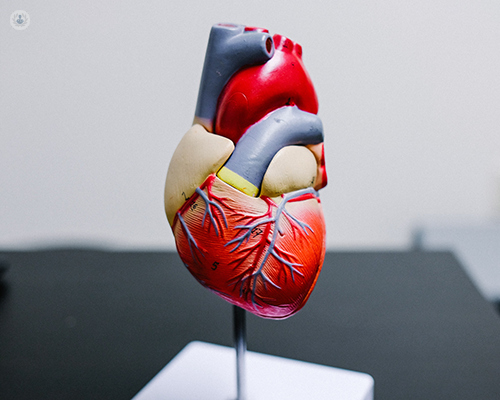Coronary artery bypass surgery: Everything you need to know
Autore:In modern cardiac care, coronary artery bypass surgery stands as a vital intervention for many people with severe coronary heart disease, offering significant improvements in quality of life and reducing the risk of cardiovascular events.
Here, Professor Wael Awad, renowned consultant cardiothoracic surgeon in London, provides his expert insight into the procedure, discussing its significance, techniques, and overall impact on heart health.

Why might I need coronary artery bypass surgery?
Coronary artery bypass surgery becomes necessary when the coronary arteries, responsible for supplying oxygen-rich blood to the heart muscle, become obstructed or narrowed due to a condition known as coronary heart disease. Coronary heart disease typically results from the buildup of plaque - a mixture of fat, cholesterol, and other substances - within the arteries, hindering blood flow to the heart.
If medication and lifestyle changes are ineffective, patients still experiencing symptoms such as chest pain (angina) or shortness of breath might be candidates for coronary artery bypass surgery. Additionally, if diagnostic tests reveal severe blockages in multiple coronary arteries, coronary artery bypass surgery may be recommended in some cases to improve blood flow to the heart and alleviate symptoms.
What type of pre-operative tests or evaluations will I need to undergo before coronary artery bypass surgery?
Before undergoing coronary artery bypass surgery, patients will undergo a series of pre-operative tests and evaluations to assess their overall health and the extent of coronary artery disease. These evaluations may include:
- Electrocardiogram: An electrocardiogram assesses the heart's electrical activity and detects any irregularities.
- Echocardiogram: An echocardiogram is a type of ultrasound that evaluates the heart's structure and function.
- Stress test: A stress test measures the heart's response to physical exertion, helping determine the presence and severity of coronary artery disease.
- Cardiac catheterisation: Cardiac catheterisation involves threading a catheter through the blood vessels to visualise blockages in the coronary arteries.
These tests provide valuable insights that aid in surgical planning and ensure the safety and efficacy of the procedure.
What does coronary artery bypass surgery consist of?
Coronary artery bypass surgery is a surgical procedure that aims to restore blood flow to the heart muscle by bypassing obstructed or narrowed coronary arteries. The operation is performed under general anaesthesia.
During surgery, the cardiothoracic surgeon will make an incision in the chest, usually along the sternum (a median sternotomy) or between the ribs (a minimally invasive approach), to provide access to the heart.
Healthy blood vessels, known as grafts, will then be harvested from other parts of the body to serve as bypasses for the blocked coronary arteries. Commonly-used grafts include the internal mammary artery from the chest wall and the saphenous vein from the leg. Sometimes, arteries from the forearm or other blood vessels will also be used.
After the grafts have been harvested, the surgeon will create new pathways for blood flow by attaching one end of each graft to the aorta and the other end to the coronary artery beyond the blockage. This pathway will bypass the obstructed portion of the artery, allowing blood to reach the heart muscle more freely.
Once the grafts are securely in place and blood flow is restored, the surgeon will close the chest incision using sutures or staples. In some cases, temporary wires will be used to close the sternum, which will eventually be removed during a follow-up appointment.
What are the risks and potential complications associated with coronary artery bypass surgery?
Like any surgical procedure, coronary artery bypass surgery carries risks and potential complications. These may include:
- Bleeding: During or after surgery, excessive bleeding may occur, necessitating blood transfusions or surgical intervention.
- Infection: There is a risk of developing a surgical site infection or pneumonia following coronary artery bypass surgery.
- Heart rhythm disturbances: Some patients may develop irregular heart rhythms (arrhythmia) after surgery.
- Complications associated with anaesthesia: Adverse reactions to anaesthesia are possible, although rare.
How long does coronary artery bypass surgery take, and how long is the recovery period after?
The duration of coronary artery bypass surgery varies depending on factors such as the number of bypass grafts needed and the patient's overall health. On average, the procedure may last anywhere from three to six hours.
Following surgery, patients will typically spend a few days recovering in the hospital, with intensive care immediately post-surgery and then gradually transitioning to a regular hospital room as they stabilise. The recovery period at home may span several weeks to months, during which patients are advised to gradually resume normal activities under the guidance of their healthcare team.
Will I need cardiac rehabilitation after coronary artery bypass surgery?
Cardiac rehabilitation plays a crucial role in the recovery process for patients who have undergone coronary artery bypass surgery. This structured program will encompass exercise training to regain cardiovascular fitness, medical education on heart-healthy habits, and psychosocial support to enhance recovery and reduce the risk of future cardiovascular events.
To schedule an appointment with Professor Wael Awad, head on over to his Top Doctors profile today.


